- Home
- Roddy Doyle
Bullfighting: Stories Page 9
Bullfighting: Stories Read online
Page 9
—A terrible time they gave him, said his mother.
—Priests? said Bill.—A priest?
—Yes!
She was shouting – he thought she was. He was whispering.
—D’you want to leave? he asked.
—Why should I?
He heard feet, shoes. His father was there, making his way in, waving at someone who’d turned to look, smiling.
He sat down beside Bill.
—Here we are.
His mother leaned out a bit, so she could see past Bill.
—Is it serious out there yet?
—The rain?
—Yes.
—No, it’s grand. It might stay away. Probably not, though.
Bill sat between them.
—That must be Martin’s son there, said his father.—The tall lad fussing with the mass cards on the coffin.
—Martin wasn’t a tall man.
—He was.
—Not that tall, said Bill’s mother.
—No, said his father.—But that seems to be the way. They get taller and taller. Each generation. Look at Billy’s gang. Great tall girls.
—Is that a daughter up there now?
—Or a wife.
—That hair’s natural, I’d say. The colour.
—Natural or no, she’s a good-looking lassie.
—Lovely, said his mother.—It’s lovely to see.
The church was filling up.
—He got a good crowd, said Bill’s father.
His mother sat forward. She was looking at the altar, the side opposite the coffin. A door had opened and people in front of him were beginning to stand. He saw an altar boy walk out before bodies got in the way and he stood up too. He heard his father groan as he stood. He watched his mother’s hands grip the bench in front of her. He looked up, and saw the priest. He’d gone across the front of the altar and he was shaking hands with the people in the front row, the widow, the children, grandchildren. Bill looked quickly at his mother. She was fine – relaxed, curious.
The mass started and people sat. Bill tried to get rid of the terror, the fierce guilt that had a sore hold of his stomach. He glanced at his father. He looked fine, alert; he seemed to be enjoying himself. He looked at his mother. She was there again – his mother – leaning forward, watching, her lips moving very slightly. Bill sat between them, afraid to let his arms and shoulders touch either of them; the contact would push something, a button, a memory. The priest was young, in his thirties, but he went through the lines like an older man. He didn’t even recite them. The voice was a drone; Bill only heard the words because he’d known them all his life. The tan was even stranger. It was dark in the church but the altar was well lit and your man, the priest, had definitely been under a lamp or had gone at himself with a can of false tan. The vestments were purple; the skin was orange. Chasuble. The word popped open. The name of the priest’s purple cape. It had been there in Bill’s head, waiting. Thirty years. Forty. Alb. Stole. He couldn’t see the priest’s shoes. He wondered were they proper black, hoped they weren’t. He’d give the man a pair of Keds. A priest wearing Keds. At a funeral. He wasn’t sure what Keds were. He’d heard the girls, his daughters, talking about them. Something about gay men wearing Keds. He liked the name. He’d put a pair on the priest. Orange ones, to go with the tan.
She was there again. The stranger. Her elbow went into Bill’s ribs as she stood up, fell back, stood, gripped the bench, like she wanted to snap the wood, break through the back of the pew.
He was going to pull her back. He’d gently grab her, try to get her out.
Everyone else was standing now, obeying some command he’d missed.
She was growling. He could hear her, under the Apostles’ Creed. He suffered under Pontius Pilate, was crucified, died and was buried. She growled – there were no words. There was no one looking at her yet. The bench, at her other side, was empty. There was no one right behind them. Bill was ready now to grab her arm. He looked at his father. He nudged him.
—What?
His father shouted. He will come again to judge the living and the dead.
—Ma isn’t well, said Bill.
—Oh.
His father leaned out, looked at Bill’s mother.
—Right.
He moved, along the pew, to the centre aisle. Bill thought his father would trip over – there was hardly any room for his feet. But he made it to the aisle. He started to genuflect. He was shaking slightly – Bill thought. But he was fine. He’d straightened up, steadied himself. He was turning away from the altar and the coffin.
Bill made himself do it: he put his hand on his mother’s arm. He squeezed gently, pulled gently.
—What’s wrong? she said.
She looked fine; she was his mother. He thought about calling his father back.
—Da’s not feeling well, he said.
He moved, and she came with him. He let go of her sleeve.
—Excuse me, sorry – thanks.
His mother was beside him, in against him. He smiled at people he didn’t know. He looked at the ground.
They were out.
His father was there.
—Alright, love?
He moved to meet Bill’s mother as she came off the last step.
—I’m fine, she said.—Are you alright?
—I’m fine. We’re both fine.
—I’ll look after you.
—Good girl. I know you will.
They stood beside each other.
—They won’t touch you.
—No, said Bill’s father.—They won’t. Not with you minding me.
The rain was starting, hard drops that blackened the ground around them.
—Will we get in the car? said Bill.
He wanted to get sick. He really did. Thinking – trying not to think – about what he’d just learnt, what he might have learnt. His father as a boy. Bill couldn’t remember his grandmother’s house, the house his father had grown up in. He couldn’t really remember his grandmother either. A bottle of red lemonade and a Club Milk – they were all he could remember clearly, the only things he could see. Sitting at a table, the kitchen. His chin resting on the table; he was very small, very young. His granny was off to the right, on the other side of the table. She wasn’t sitting; she was busy. She was talking to other people. Her back, and grey hair. That was all Bill had. His mother was sitting there too. His father was somewhere else. Bill remembered where: he was down the street, visiting a cousin. But he couldn’t remember his granny. He knew he’d liked her – he’d loved her. He knew he’d liked going there. He couldn’t remember her funeral. He didn’t know if he’d been at it.
—Alright, Billy-boy?
His father was looking at him.
—Yeah, said Bill.—Yeah. We’ll get into the car.
—Good idea. Come on, love.
Bill went at their pace, across the car park. He clicked the doors open before they got to the car. He opened his father’s door, his mother’s.
—Good man.
His mother slid in. His father closed the front passenger door and bent down at his mother’s door.
—Scoot in there, he told her.
He stood, so he could look at Bill over the car roof. Bill could see the pain in the eyes as his father straightened his back.
—I’ll get in beside your mother, he said.—You’ll be alright on your own.
—I’ll be grand, said Bill.
He waited till his father was sitting inside – he didn’t want to hear the groans – then he got in behind the wheel and wiped the rain from his face.
He looked in the rear-view mirror.
—What now? he said.
—What’s that?
—Where to?
They both looked small and lost back there.
—Home, I think, said his father.—What d’you say, love?
She nodded.
—It’s a bit wet for the graveyard, she said.
There w
ere bubbles and cracks in her voice, as if some of the rain had got into it.
—Right, said Bill.—I’ll get started, so we can have some heat.
—Good man.
Bill trusted his hands, his arms, his control of the wheel. The wipers cleared the rain off the windscreen. His stomach was grand; he felt safer in the car. The noise of the engine, the wipers and the heater filled the hole.
Wexford. He reminded himself – he had to; that was where they were. His mother had growled in the church. She’d told him his father had been abused by a priest – he thought she had.
He looked in the rear-view again.
—Do you have your belts on?
They were sitting apart now, a window each.
—I do.
—I forgot, hang on.
His father muttered.
—Bloody thing.
Then he looked at Bill’s eyes in the mirror.
—All set here now.
—Fine, said Bill.—Here we go.
It was easy-going, good roads, the new motorway. The rain didn’t matter. He turned down the heat. He said nothing for a while; they said nothing. He turned on the radio, changed his mind, turned it off. They didn’t object. He looked in the mirror
—I’m sorry.
It was his mother. She’d seen his eyes.
—Why? said Bill – and his father.
—I spoilt your day.
—You didn’t.
—Not at all.
—I think I probably did.
—No.
—It all came back, she said.
Bill watched his father nod – once, twice. His father’s hand was there now, resting on his mother’s shoulder.
—A terrible time, said his mother, to Bill; she was looking at the mirror. There was a truck far ahead, nothing else. Nothing behind him.
—It was, said his father.
—But I rescued you, she said.
—That’s right.
—He was in the Artane Boys’ Home, his mother told the mirror.
Something had happened. Suddenly – as fast as it took him to check that the road ahead was still clear – Bill knew he didn’t have to believe this. He didn’t have to change his past.
—We broke down the wall, she said.—We blew it up.
—That’s right.
—They were making him play the tin whistle, she said.—For that band they had. The boys’ band.
—It was torture, said his father.
Bill looked at the father. He was looking at Bill’s mother.
—But we shot them all, she said.
—That’s right.
—I shot most of them.
—I’ll never forget it. The bullets were hopping.
Bill looked at her, at him. They were crying, both of them. Moved to tears by memories of things that could never have happened. Jesus Christ, he thought, they’ve slipped into it together.
—The way you burst in, said his father.—You should have seen her, Billy.
—They had big leather straps, she said.—The priests.
—They were Brothers, said his father.
—They were making you play the tin whistle.
—Absolute torture.
—It’s a horrible instrument.
—Even in the right hands, said Bill’s father.—But you came and saved me.
—Your poor lips were chapped.
The stories were going to get better. For a while. Bill watched his father wipe his eyes with a white handkerchief. Then, he supposed – Bill supposed – the funerals were going to stop. They wouldn’t know who’d died. Or he’d be bringing them to the funerals of men and women who’d never existed. He hadn’t noticed it starting. The decline, the slide. There must have been signs – things his mother had said, or his father. Bill had missed them, or ignored them.
It was quiet. He looked in the rear-view. They were both awake.
—Will I stop at the chipper? he asked.
—Oh, do, said his mother.
—That’s where we went after your mother rescued me, said his father.—D’you remember that, love?
The roundabout was ahead. The end of the motorway, the beginning of Dublin.
—That’s right, said his mother.—They watered the horses for us as well.
—I’d forgotten about that, said Bill’s father.—You’re right.
Bill looked in the rear-view. His father was staring back at Bill, waiting. He winked.
Blood
He grew up in Dracula’s city. He’d walked past Bram Stoker’s house every day on his way to school. But it had meant nothing to him. He’d never felt a thing, not the hand of a ghost or a shiver, not a lick on his neck, as he passed. In fact, he was nearly eighteen, in his last year at school, before he’d even noticed the plaque beside the door. He’d never read the book, and probably never would. He’d fallen asleep during Coppola’s Dracula. One minute his wife was screaming, grabbing his knee; the next, she was grabbing the same knee, trying to wake him up. The cinema lights were on and she was furious.
—How can you do that?
—What?
—Sleep during a film like that.
—I always fall asleep when the film’s shite.
—We’re supposed to be out on a date.
—That’s a different point, he said.—For that, I apologise. How did it end, anyway?
—Oh, fuck off, she said, affectionately – that was possible in Dublin.
So the whole thing, the whole Dracula business, meant absolutely nothing to him.
Nevertheless, he wanted to drink blood.
Badly.
The badly was recent, and dreadful. The itch, the urge, the leaking tongue – it was absolutely dreadful.
He wasn’t sure when it had started. He was, though – he knew when he’d become aware.
—How d’you want your steak?
—Raw.
His wife had laughed. But he’d been telling her the truth. He wanted the slab of meat she was holding over the pan, raw and now – fuck the pan, it wasn’t needed. He could feel muscles holding him back, and other muscles fighting for him – neck muscles, jaw muscles.
Then he woke.
But he was awake already, still standing in the kitchen, looking at the steak, and looking forward to it.
—Rare, so, he said.
She smiled at him.
—You’re such a messer, she said.
He hid behind that, the fact that he acted the eejit, that it was him, as he bent down to the charred meat on the plate a few minutes later, and licked it. The kids copied him and they all ended up with brown gravy on their noses. He made himself forget about his aching jaws and the need to bite and growl. They all watched a DVD after dinner, and everything was grand.
And it was; it was fine. Life was normal. For a while. For quite a while. Weeks – he thought. He opened the fridge one day. There were two fillet steaks on a plate, waiting. It must have been weeks later because she – her name was Vera – she wouldn’t have bought steak all that frequently. And it wasn’t the case that Vera did all the shopping, or even most of it; she just went past the butcher’s more often than he did. She bought the food; he bought the wine. She bought the soap and toilet paper – and he bought the wine. You’re such a messer.
He grabbed one of the steaks and took it over to the sink. He looked behind him, to make sure he was alone, and then devoured it as he leaned over the sink. But he didn’t devour it. He licked it first, like an ice pop; it was cold. He heard the drops of blood hit the aluminium beneath him, and he felt the blood running down his chin, as if it – the blood – was coming from him. And he started to suck it, quickly, to drink it. It should have been warm. He knew that, and it disgusted him, the fact that he was already planting his disappointment, setting himself up to do it again – this – feeding a need, an addiction he suddenly had and accepted. He growled – he fuckin’ growled. He looked behind him – but he didn’t care. You’re such a messer. He chewed till it
stopped being meat and spat the pulp into the bin. He rubbed his chin; he washed his hands. He looked at his shirt. It was clean. He ran the hot tap and watched the black drops turn red, pink, then nothing. He took the remaining fillet from the fridge and slid it off the plate, into the bin. He tied the plastic liner and brought it out to the wheelie bin.
—Where’s the dinner? Vera wanted to know, later.
—What?
—I bought fillet steaks for us. There.
She stood in front of the fridge’s open door.
—They were off, he said.
—They were not.
—They were, he said.—They were minging. I threw them out.
—They were perfect, she said.—Are they in here? She was at the bin.
—The wheelie, he said.
He hadn’t expected this; he hadn’t thought ahead.
—I’m bringing them back, she said, as she moved to the back door.—The fucker.
She was talking about the butcher.
—Don’t, he said.
He didn’t stand up, he didn’t charge to block her. He stayed sitting at the table. He could feel his heart – his own meat – hopping, thumping.
—He’s always been grand, he said.—If we complain, it’ll – I don’t know – change the relationship. The customer – client thing.
He enjoyed listening to himself. He was winning.
—We can have the mince, he said.
—It was for the kids, she said.—Burgers.
—I like burgers, he said.—You like burgers.
The back door was open. It was a hot day, after a week of hot days. He knew: she didn’t want to open the wheelie and shove her face into a gang of flies.
They had small burgers. The kids didn’t complain.
That was that.
Out of his system. He remembered – he saw himself – attacking the meat, hanging over the sink. He closed his eyes, snapped them shut – the idea, the thought, of being caught like that. By a child, by his wife. The end of his life.
He’d killed it – the urge. But it came back, days later. And he killed it again. The fridge again – lamb chops this time. He sent his hand in over the chops, and grabbed a packet of chicken breasts, one of those polystyrene trays, wrapped in cling-film. He put a finger through the film, pulled it away. He slid the breasts onto a plate – and drank the pink, the near-white blood. He downed it, off the tray. And vomited.

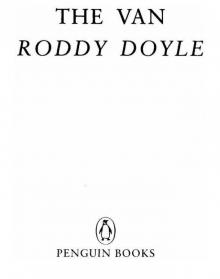 The Van
The Van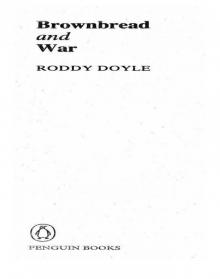 Brownbread & War
Brownbread & War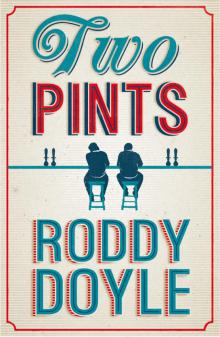 Two Pints: A Collection
Two Pints: A Collection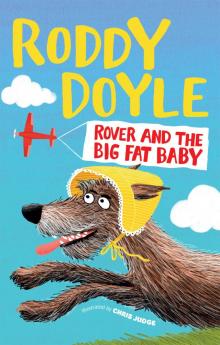 Rover and the Big Fat Baby (Giggler 4)
Rover and the Big Fat Baby (Giggler 4)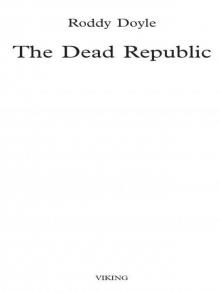 The Dead Republic
The Dead Republic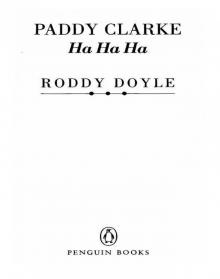 Paddy Clarke Ha Ha Ha
Paddy Clarke Ha Ha Ha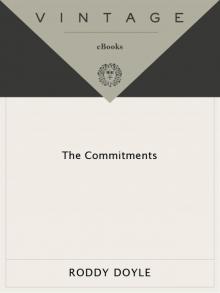 The Commitments
The Commitments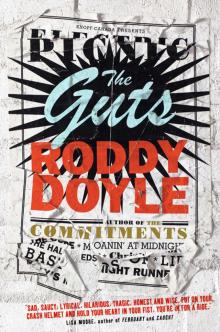 The Guts
The Guts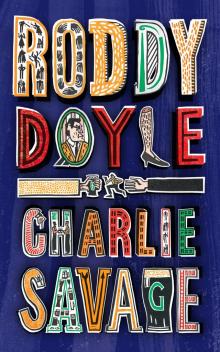 Charlie Savage
Charlie Savage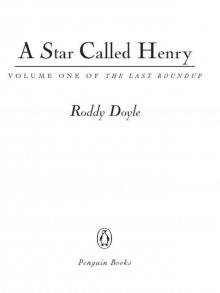 A Star Called Henry
A Star Called Henry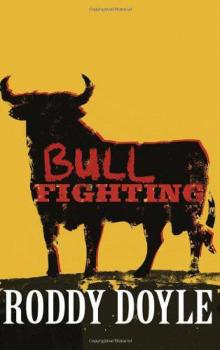 Bullfighting: Stories
Bullfighting: Stories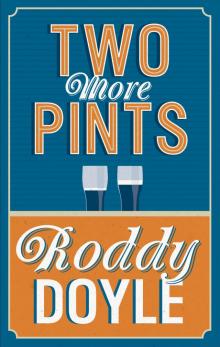 Two More Pints
Two More Pints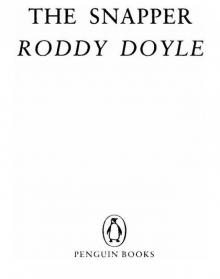 The Snapper
The Snapper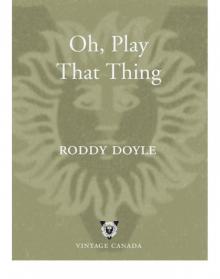 Oh, Play That Thing
Oh, Play That Thing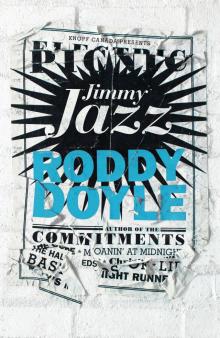 Jimmy Jazz
Jimmy Jazz Paula Spencer
Paula Spencer Wilderness
Wilderness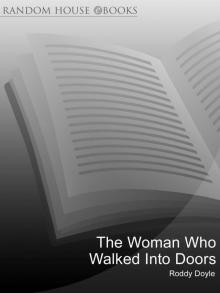 The Woman Who Walked Into Doors
The Woman Who Walked Into Doors The Deportees
The Deportees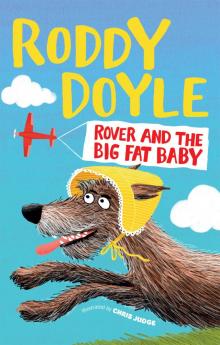 Rover and the Big Fat Baby
Rover and the Big Fat Baby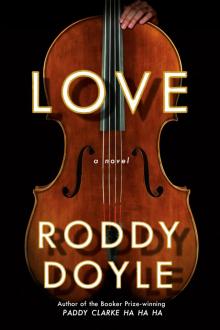 Love
Love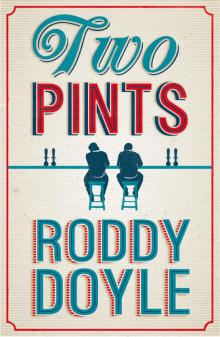 Two Pints
Two Pints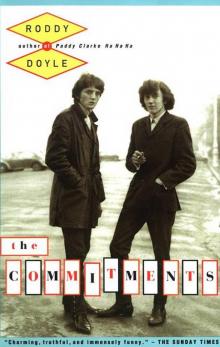 The Commitments b-1
The Commitments b-1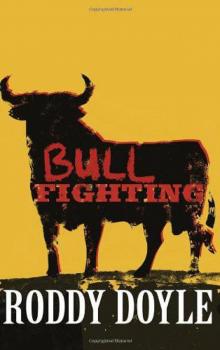 Bullfighting
Bullfighting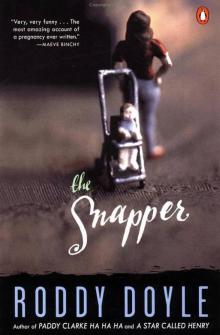 The Snapper b-2
The Snapper b-2